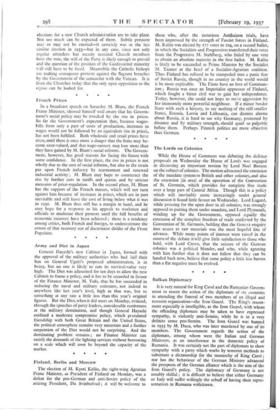French Prices In a broadcast speech on Saturday M. Blum,
the French Prime Minister, showed himself well aware that his Govern- ment's social policy may be wrecked by the rise in prices. So far the Government's expectation that, because wages- bills form only a part of costs of production, increases in wages would not be followed by an equivalent rise in price's, has not been fulfilled. Both wholesale and retail prices have risen, until there is once more a danger that the franc may be- come over-valued, and that wage-earners may lose more than they have gained by M. Blum's social reforms. The Govern- ment, however, has good reasons for facing the future with some confidence. In the first place, the rise in prices is not wholly due to the cost of social reforms, but also to the strain put upon French industry by rearmament and renewed industrial activity ; M. Blum may hope to counteract the rise by further cuts in tariffs and quotas and by stricter measures of price-regulation. In the second place, M. Blum has the support of the French masses, which will not turn against him because of increases in prices, which are in part inevitable and still leave the cost of living below what it was in 1930. M. Blum thus still has a margin in hand, and he may hope for a response to his appeals to workmen and officials to moderate their protests until the full benefits of economic recovery have been achieved ; there is a tendency among critics, both French and foreign, to underestimate the extent of that recovery out of doctrinaire dislike of the Front Populaire.














































 Previous page
Previous page